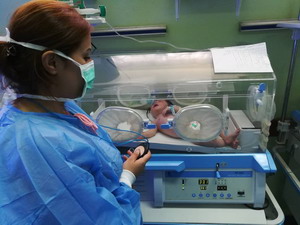 Training on clinical signs during the programme at Zaid Ash-Shariti Hospital in As-Sweida governorate © WHO Syria 201825 July 2018 – Childirth is often filled with uncertainty, especially for women living in conflict-affected or insecure environments. WHO has launched a new programme to help Syrian mothers during their pregnancy and after birth to manage this life-changing event.
Training on clinical signs during the programme at Zaid Ash-Shariti Hospital in As-Sweida governorate © WHO Syria 201825 July 2018 – Childirth is often filled with uncertainty, especially for women living in conflict-affected or insecure environments. WHO has launched a new programme to help Syrian mothers during their pregnancy and after birth to manage this life-changing event.
The “caring for the newborn at home” initiative guides all mothers on the steps they and their families can take to ensure their newborn children have a healthy start in life.
Under the new programme, WHO-trained community health workers will make home visits to help mothers during pregnancy and after childbirth. To begin with, the programme is being introduced in areas that are newly reconciled, or where there is limited access to health care. It aims to reach 10 000 beneficiaries per year.
“Although pregnant women normally receive antenatal care, the equally important period following birth is sometimes neglected”, said Elizabeth Hoff, WHO Representative in Syria. “Syria is one of the first countries in the Region to implement this WHO programme.”
Fathyah, from Homs governorate, says that she is very happy to be part of the programme. "Unlike during my previous pregnancies, health care workers have been visiting me at home to help me take care of my baby,” she said. “I’ve learned so much, including how important it is to begin breastfeeding within half an hour of birth. For the first time since the conflict began, I feel that there are people who really care about me and my family,” she added.
Most maternal and newborn deaths occur during delivery or within 24 hours of birth. This WHO programme will help families adopt appropriate home care practices with help from skilled and trained community health workers.
“This training will help educate Syrian mothers and eliminate potentially harmful practices”, said Fatima, a community health worker from Homs governorate. “After years of turmoil affecting access to health care for pregnant women and mothers, a programme like this is needed more than ever.”




